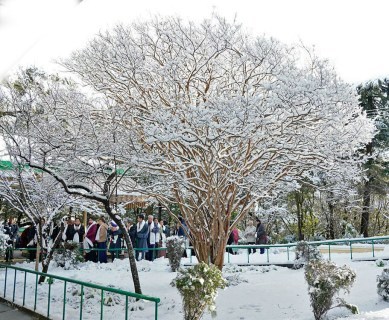Georgi Y. Johnson's Blog: I AM HERE - Opening the Windows of Life & Beauty, page 8
March 14, 2019
Spiritual Psychology 1, Israel May 30 @ 9:00 am – June 3 @ 5:00 pm
In this first module of the Spiritual Psychology Education we will learn:
1. To open and refine the felt sense, deepening connection, and alignment to ourselves and the world.
2. To relax into allowing the healing impact of consciousness to move through the physical, as the primary agent of healing.
3. To meditate with a relaxed method that instantly invites more grounding, balance, alignment, and openness into the experiential field.
4. To inquire into our fundamental psychological assumptions about ourselves and others, moving from limited belief systems to the realm of possibility and transformation.
The Spiritual Psychology Education offers carefully structured exercises, meditations, knowledge, and training to allow increasing depths of happiness and freedom. This grounded, integrated system for inner growth, healing, and spiritual psychology liberates fear and allows for the joyful reunion of individual purpose with true nature. The education brings the skills and wisdom needed to become a practitioner of spiritual psychology and/or to deepen the feeling connection with any chosen way of life.
This is a unique chance to study with Bart ten Berge AND Georgi Y. Johnson in Zichron Yaakov, Israel.
Module 1 of Phase 1 is perhaps the most profound of all the modules within the seven-year system. In the five days, you’ll learn exercises and meditations that support the relaxation and opening of the felt-sense through contacting the subtle energy body. Safe, grounded and friendly, these workshops are the first step in reuniting with the source of all we are:: the first step in the direction of home.
For all upcoming events in Israel with Bart & Georgi, CLICK HERE
About Georgi & Bart
[image error]Born in Holland, Bart ten Berge is a qualified medical and homeopathic doctor with some 30 years experience pioneering, teaching and transmitting the system now formulated as the Spiritual Psychology Education. British-born Georgi Y. Johnson is the author of a series of books on spirituality and healing, refining and integrating the ancient insights of nonduality and timeless mysticism into the practice of psychology. Together and individually, they teach and give private mentorship around the world.
The ISSP Education in Spiritual Psychology consists of three phases, with each phase forming a complete training. To begin a subsequent level, the previous level must have been completed, or a similar course followed (to be approved by the facilitator). All three phases are individually certified by the ISSP and are recognized by the CRKBO (The Central Register for Short Vocational Education) in the Netherlands.
You can read more about spiritual psychology here: http://www.inner-growth.org/the-healing-education/
For questions and/or to register, contact Georgi:info@iamhere.life
+972 524297196
Please send a message to +972 524297196 to join the local WhatsApp group and to be notified of future events like this one.
Click here for other upcoming events in Israel
Living Gnosis: {Dare Little Demon}
For ages, I ran from evil. Eyes averted, cheek turned, buttocks and fists clenched tight. And when it stopped chasing me, I started chasing it, hunting down its disguises, daring to dethrone its devilish dominion.
 But this morning, slithering through a cut of human pain, she came, and what had been outside was suddenly within. Yes, we said that we are one, so I disarmed the arsenal of the separate self, and now, here is evil, inside-out.
But this morning, slithering through a cut of human pain, she came, and what had been outside was suddenly within. Yes, we said that we are one, so I disarmed the arsenal of the separate self, and now, here is evil, inside-out.
Ah, the rage at the despicable, stupid crowd, and a suicidal cyclone within, that stains outer contempt with shame. Chaos and murder, she screams. Spit in the furnace of senseless lies, where everyone, anyway dies. Cremate, sedate, cremate, and whatever you do – in this most unholy hour – don’t hesitate to hate.
Yet, just as the blood cursing through these veins darkens, so does this soul seem greater and graver even than death.
“What is it you want, dear demon?” asks the soul, wordlessly.
“I want this, and this, and this and all that you are. I want your life, your love, your success. I want to be you, own you, rule you, consume you. I have to be you, and so I must destroy you, but if I destroy you, how long can I be you? Impossible, ravenous twist of fate.
I long, long, long to belong. Oh, how I long to belong. We’re thrusting out of earth toward heaven. Hurry now, god-speed, don’t tarry in human soil. Get out of here. Oh, how I hate, hate, hate you.”
 Dear Demon, says the soul, dare to have it all. Take these eyes and see; take these ears and hear; take these hands and feel the miracle of touch.
Dear Demon, says the soul, dare to have it all. Take these eyes and see; take these ears and hear; take these hands and feel the miracle of touch.
Will you use this tongue to taste the mystery in the wind? Won’t you take this epithelium harp and sample the subtle incantations of the night?
See little demon, see: the vastness of the ocean echoing distant thunderous clouds with undulating new-born depths of navy gray.
Hear that bird on a pole, master of infinite blue, singing with the majesty of the all-becoming, heedless to audience or judge.
Feel the speed of the wind as it brushes us with foretelling warmth.
Watch houses and homes where inmates nestle in silent comfort.
Hold this small stone and feel the crushing ache of eternity in your grasp.
How is it now, dear Demon, how is it now?
She speaks now with thinner sounds:
 “There’s no place for me.
“There’s no place for me.
See! Each thing is home to itself. The ocean rests in the ocean, the bird in the bird, the home in the home, the night in the night. But for me, I have no such place.
Forever excluded from the family of things, I have no rest.
If I am an ocean, then I must be the sky, and if I am sky then I must be a bird. If I am home, then I must be the freedom of the wind. No place for me, no place to hide.”
“So, stay, dear demon,” says the soul. “Endeavour here to rest a while as a simple, human paradox, unwittingly alive and shameless as the sun. And later, we’ll breach the horizon to a finer kind of time where distinction dissolves and unearthly cravings born of deficiency may melt into the trumpeting of celestial exultation.”
March 10, 2019
Legacy of Trauma: Complex PTSD Transmitted to Tutsi Descendants
Nearly 25 years after the genocide against the Tutsi of Rwanda took the lives of up to one million victims, the offspring of Tutsi survivors, who weren’t even born at the time, are among those most affected by trauma, according to a new study published by researchers at Bar-Ilan University, in collaboration with a Rwandan therapist and genocide survivor.
The study assessed complex PTSD (CPTSD) among Tutsi genocide survivors and the impact on their offspring.
 The researchers found that the intergenerational effects of genocide were most prominent among offspring of survivors who suffer from CPTSD. These offspring suffer from more symptoms, such as thoughts and nightmares about the genocide, and feel less equipped to handle adverse situations. The findings also allude to the possibility that whereas both parental PTSD & CPTSD increase secondary traumatization in offspring, parental CPTSD additionally affects offspring self-perceptions.
The researchers found that the intergenerational effects of genocide were most prominent among offspring of survivors who suffer from CPTSD. These offspring suffer from more symptoms, such as thoughts and nightmares about the genocide, and feel less equipped to handle adverse situations. The findings also allude to the possibility that whereas both parental PTSD & CPTSD increase secondary traumatization in offspring, parental CPTSD additionally affects offspring self-perceptions.
Whereas PTSD includes symptoms such as nightmares and overall restlessness, CPTSD includes graver impairments such as affective dysregulation, negative self-concept, and disturbed relationships. Following studies pointing to additional consequences of extreme traumatic events such as genocide, which are not covered by existing diagnosis of PTSD, CPTSD is scheduled to appear in the upcoming 11th Revision of the International Classification of Diseases (ICD-11) as a new diagnostic entity.
The preliminary findings, published in the journal Psychiatry Research, highlight CPTSD as a rather frequent debilitating condition among Tutsi genocide survivors. “For the first time, to the best of our knowledge, these findings demonstrate that CPTSD may have grave consequences not only for survivors themselves but also for their offspring who were born after the genocide,” said Prof. Amit Shrira, of Bar-Ilan University’s (BIU) Interdisciplinary Department of Social Sciences, who co-authored the study with Dr. Ben Mollov, a political scientist at BIU who specializes in conflict resolution, and Ms. Chantal Mudahogora, a therapist who survived the Tutsi genocide and currently resides in Canada. “The bulk of existing literature focuses on the effects of parental PTSD, but we know of no works that looked at parental complex PTSD,” he added. This pattern is also evident among Holocaust survivors and their offspring, whom Shrira has studied extensively.
 “We need to understand that genocide and massive trauma can leave their mark not only on survivors who were directly exposed but also on their offspring and probably on other family relatives, as well. We also know from previous studies that the effects of trauma may extend across several generations and linger for decades after the focal trauma took place. These insights should guide policymakers and clinicians when planning interventions aimed at mitigating the plight of traumatized individuals and their families, particularly in terms of increasing resilience. This can also bear relevance for improved intergroup relations,” said Mollov.
“We need to understand that genocide and massive trauma can leave their mark not only on survivors who were directly exposed but also on their offspring and probably on other family relatives, as well. We also know from previous studies that the effects of trauma may extend across several generations and linger for decades after the focal trauma took place. These insights should guide policymakers and clinicians when planning interventions aimed at mitigating the plight of traumatized individuals and their families, particularly in terms of increasing resilience. This can also bear relevance for improved intergroup relations,” said Mollov.
The opportunity for Shrira and Mollov to study the genocide against Tutsi of Rwanda and cooperate with Mudahogora arose when Mudahogora heard Mollov present a research paper in Bangkok. When she shared with him her concern about the effects of post trauma on survivors of the genocide and their offspring, Mollov brought Shrira, who has studied extensively intergenerational trauma suffered by Holocaust survivors and their offspring, into the research partnership.
As the researchers learned more about survivors of the Tutsi genocide, they were especially surprised to discover that they live among the Hutus who took part in the mass killing, and to learn from Mudahogora that through the Unity and Reconciliation Program spearheaded by the government of Rwanda, together with non-profit organizations and faith-based groups, both ethnic groups are making progress in living together peacefully and in harmony; there are even cases of Tutsi survivors who married Hutu perpetrators and brought them into their families. In the near future the researchers intend to gain a better understanding of this phenomenon among survivors and their offspring.
The researchers hope to present their findings at a seminar in Rwanda and offer assistance in developing applied research and intervention strategies, such as treatment of trauma and seeking to promote unity and reconciliation, to Rwandan stakeholders.
Living Gnosis: {Elemental Love}
Here you are, the other, myself.
In the terrifying rupture of seamless silk, so finely woven, it feels eternity had us in untraversable unity, and now all is lost and losing.
This pain is truer and more alive than eons of human misery.
Love shocked in apparitions of cruelest hate, as the gap between us relays outcast truths and something beneath the finest kiss of life declares the dissolution of the wedding vows of time and space.
Here you are, my other, myself.
How could I anoint you?
With a poisoned chalice, or betrayal in a kiss?
With impoverished vapors of contempt, or with a nudge toward eternity’s cliff-edge of the irredeemably condemned?
Can I rage over the nasty requisite of your humiliation?
Will I demonize the ground cursed by your human feet?
Will I recruit the mob to bring you down, down, down, oh perpetrator of impossible pain?
Here is the cynical twist, where the unbearable agony of being apart curls into the seducing dream. Evil: the consummating kiss of all aversion.
How will I reject you?
I cannot even fear you.
You are the kernel of a nut promising trees of endless bounty.
You are the rotting flesh feeding the exquisite gardens of creation.
You are the wintered flower foretelling springtimes of preternatural presence.
You are the coastline cavern engendering space for the primal ecstasy of salty, explosive waves. Your very contours are carved and stroked by baptismal seasons of elemental love.
Wilder than the night, yet – like death itself – familiar from a billion finite passages, you are known to me, my enemy, my friend, my bright star of hate, my lover, myself.
Intimate and infinite in this everlasting instant of sensuously seeing through you, seeing through me.
Here you are, my lover, myself.
March 7, 2019
Living Gnosis: {Fail Male}
How we long to believe we’re protected. Quietly exaggerating this, and blinding that, striving to get a sense that we’re loved and held, that a noble, loyal spirit surrounds us with safety, that we will never be harmed.
Father, can you find me in the night? Father, will you save me? Father, can you take the shadows away?
We wanted a savior, but you were pretending without knowing it, addicted to the light, intoxicated by the charm of infinite bounty. Drunk by your own glory, you began to believe yourself majestically immune, transcendent, distant from it all. And with the opiates of adoration numbing you to the shearing isolation that lurks in all this glory, you stressed more urgently away from the suicidal kiss found in every particle of touch. You flew from the empires of lies and into the skies, and losing the plot, you lost us all.
The promise imploded in our hearts like a trick, a rape, with a mist of foulest sedition.
Beguiled, betrayed and vengefully hopeless, we freeze our faces to your crestfallen glare and as the nectar of power drains out, all that’s left is a kernel of despair.
Fail, fail, fail, don’t you know, that every male must fail?
Adorned in jewels of salvation and bliss; a trajectory of miracles eroded by crystalline love now predicts that this savior, defender, liberator, god – must surely die.
This is your customized crucifixion. Stumble into your masterpiece.
Oh, beloved: you’ll be blinded so that you may see; you’ll be deafened so that you might hear; you’ll be numbed so that you might find the subtler sense of etheric ecstasy. All power failing now, as impotent as a lake, you lurch inward to infinite darkness broadcasting a relentless crest of truth that decimates all fantasy.
When you are there, at the furthest edge of perception, gazing into the vast unknown of your private annihilation, know this: I will never, ever leave you, for I am the darkness within the dim, numinous light that forever pulses behind your eyes.
You will die, sweetheart, you will die – so that we may truly live.
March 1, 2019
Compassion Fatigue & the Relief of Meditation
[PUBLIC RELEASE: 27-FEB-2019]
Research suggests self-care for nurses is important for professional development
Transcendental Meditation® helped to reduce “compassion fatigue” and burnout in a group of 27 nurses while also improving resilience according to a study published today in Journal for Nurses in Professional Development.
Standardized assessments showed a significant improvement after four months of practice.
“For years I watched nurses struggle to care for their patients and themselves,” said lead author Jennifer Bonamer, PhD, RN-BC, Nursing Professional Development Specialist at Sarasota Memorial Health Care System, Sarasota, FL.
“Working with people who are suffering trauma eventually takes a toll and produces what’s come to be called ‘compassion fatigue.’”
Jennifer Bonamer
Study included mostly Registered Nurses
Dr. Bonamer searched the literature for self-care methods that could help nurses cope with burnout and hypothesized that Transcendental Meditation would help relieve compassion fatigue in nurses and improve their ability to bounce back from the challenges of work.
Most of the 27 nurses in the study were Registered Nurses working directly with patients. They had been working as nurses 15.7 mean years, and in their current practice area for an average of 6.5 years.
Standardized assessments quantify benefits
The researchers used the Professional Quality of Life Scale, which includes a 30-item survey that measures compassion satisfaction and compassion fatigue on a 5-point scale. After four months of practicing Transcendental Meditation, the nurses experienced a 9.2% increase in compassion satisfaction and 18% reduction in burnout.
Resilience was measured via the Connor-Davidson Resilience Scale, a 25-item survey with statements that reflect resilient perspectives. It also uses a 5-point scale. Again, after four months of Transcendental Meditation, the nurses experienced a 16.9% increase in resilience.
“These surveys are widely used with demonstrated validity and reliability,” Dr. Bonamer said. “They demonstrated quantitatively what the nurses reported: they felt better and enjoyed their work more.”

Increasing importance of self-care techniques in nursing
There is an increasing trend toward appreciating the necessity of helping nurses in their careers by taking active steps to use self-care techniques to build resilience.
“We need to invest in our nursing staff and ensure that they have rewarding careers while also providing the best possible care for their patients,” Dr. Bonamer said. “The Transcendental Meditation technique is one step that we could take. A variety of studies have shown its effectiveness in reducing stress and promoting health and well-being.”
The nurses learned Transcendental Meditation from two certified teachers over a four-day period. They then practiced it for 20 minutes twice a day, though their demanding schedules sometimes made it challenging to fit it in. The technique is typically practiced once in the morning and then again in the late afternoon. In this video, Nourishing the Caregiver from Within, nurses describe the benefits they are receiving from their TM Program.
Previous qualitative study also found a benefit
The present study is the second of two that have used the Transcendental Meditation technique as a modality to improve the well-being of nurses. A study published in 2018 in International Journal for Human Caring reported the experience of RNs in graduate school who practiced Transcendental Meditation for four months. The qualitative study entailed the students keeping a journal and then the researchers used Giorgi’s descriptive phenomenological method to examine their journals.
The results showed that graduate students were more present and balanced, and experienced enhanced job performance. They also enjoyed greater feelings of bliss, peace, and integrity.
###
About the Transcendental Meditation Technique
Transcendental Meditation is a simple, natural technique practiced 20 minutes twice each day while sitting comfortably with the eyes closed. It is easily learned, and is not a religion, philosophy, or lifestyle. It doesn’t involve concentration, control of the mind, contemplation, or monitoring of thoughts or breathing. The practice allows the active thinking mind to settle down to a state of inner calm. For more information visit http://www.tm-women.org/nurses.
Self-Care Strategies for Professional Development: Transcendental Meditation Reduces Compassion Fatigue and Improves Resilience for Nurses, Jennifer (Rheingans) Bonamer, PhD; Catherine Aquino-Russell, PhD. DOI: 10.1097/NND.0000000000000522
Angel of Mercy – Mindfulness and Chronic Pain
It can lessen the severity and impact on daily life of chronic pain as well as the accompanying distress, the findings indicate.
This is important, say the researchers, because the most widely used psychological technique for treating chronic pain is Cognitive Behavioural Therapy or CBT. But not everyone living with chronic pain, which affects around one in five adults, finds CBT helpful.
“Breath is the bridge which connects life to consciousness, which unites your body to your thoughts. Whenever your mind becomes scattered, use your breath as the means to take hold of your mind again.”
Thich Nhat hanh
The researchers trawled research databases for relevant clinical trials looking at the effectiveness of CBT or mindfulness-based stress reduction for the treatment of chronic pain-defined as lasting at least three months.
Mindfulness is a type of meditation focusing on moment to moment awareness of thoughts, feelings, bodily sensations and the immediate environment. The stress reduction element aims to help those affected develop ways of coping more effectively with their pain.
Out of an initial 184 suitable clinical trials, 21, involving nearly 2000 people, were selected, and the results data pooled.
Most of the study participants were women and aged between 35 and 65. The conditions causing them pain were largely musculoskeletal. In nearly four out of 10 studies, participants had endured their pain for more than a decade.
The review combined both direct and indirect evidence for the potential health impact of CBT compared with usual or no care; mindfulness compared with usual or no care; and mindfulness compared with CBT.
 Calming the brain to relieve chronic pain
Calming the brain to relieve chronic painThe analysis showed that there were no important differences between either of the two techniques. Both significantly improved physical functioning and lessened pain severity and associated depression, compared with usual or no care.
The researchers sound a note of caution in respect of their findings. Only one of the 21 trials directly compared CBT with mindfulness, and only 12 trials were deemed to be of reasonable or good quality.
While the analysis produced comparable results for both techniques, the statistical margin of error was wide, meaning that it is too early to tell which of CBT or mindfulness might be better for people with different types of pain and psychological symptoms, they point out. Further research is needed to plug this gap, they say.
But they conclude: “While CBT is considered to be the preferred psychological intervention of [chronic pain], not all patients with [it] experience a clinically significant treatment response.
“Although a number of recommendations have been proposed to improve CBT for patients with chronic pain, an additional solution may be to offer patients mindfulness based stress reduction since it shows promise in improving pain severity and reducing pain interference and psychological distress.”
February 14, 2019
Dalai Lama: “Salute Our Sisters First”
“In my own case, it was my mother who first taught me about kindness. She sowed the seed in my mind,” said the global spiritual leader, “It is our mother who gives most of us a living example of kindness right at the start of our lives. On the other hand, the warriors of the past were almost entirely men. They are celebrated as heroes and yet they were killers. Isn’t it the case that most butchers too are men? Therefore, it’s reasonable to salute our sisters first.”
 The Dalai Lama put light on the human quality of loving kindness which, he says is often something we ignore or “take for granted”. Referring to conflict zones around the world as places of unfathomable suffering, he also pointed toward the nationalistic tendency behind such political manoevers as Brexit (the UK’s decision to leave the European Union.
The Dalai Lama put light on the human quality of loving kindness which, he says is often something we ignore or “take for granted”. Referring to conflict zones around the world as places of unfathomable suffering, he also pointed toward the nationalistic tendency behind such political manoevers as Brexit (the UK’s decision to leave the European Union.
“In some ways loving-kindness is something we take for granted, yet it’s something we need to make an effort to develop. Our level of education is highly developed, but look at the world around us. We’re at peace here, but elsewhere, at this very moment, people are being killed and innocent children are starving. Look at what’s happening in Syria and Yemen. We make too much of differences of nationality, faith, or race and neglect others’ suffering because they are ‘not like us’. In the 20th century, so much suffering took place due to violence and war, and yet we still tend to think that we can solve problems by resort to the use of force. This is not a healthy sign, but most of the people on this planet are fed up with violence. Look at how many demonstrated against the impending war in Iraq. Another example is the creation of the European Union by nations that had fought throughout history. After the horrors of the first and second world wars they concluded it was more important to protect the common interest rather than assert national sovereignty.”
“Anger is rooted in having a sense of ‘us’ and ‘them’. We need instead to respect others as members of humanity like us.”
“Coexistence takes effort, but we should work to make this century an era of peace and non-violence. We need a human approach to solving problems between us. We need to talk instead of fighting, engaging in meaningful dialogue based on mutual respect. Anger is rooted in having a sense of ‘us’ and ‘them’. We need instead to respect others as members of humanity like us. We must also aim to create a demilitarized world. To achieve external disarmament, however, requires inner disarmament. That’s where ‘maitri’, loving-kindness, comes in.”
The Dalai Lama repeated his message that the keys to a wiser future lie in the way we educate our children. He explained that modern education is oriented towards material goals, but it also needs to focus on inner values. Alongside physical hygiene, we need emotional hygiene, he said, learning to tackle our destructive emotions.
“‘Maitri’ and ‘karuna’, friendliness and compassion are essential in day to day life. We find them described in religious texts, but we can observe and develop them in an objective, secular way.”

Winter in Dharamshala
“Mothers gave birth to all 7 billion human beings alive today. They survived as a result of care and affection. As young children they did not care about nationality, faith or caste, but learned to distinguish such differences resulting in a sense of ‘us’ and ‘them’. This is how we create problems for ourselves, despite the fact that at a deeper level we are all the same in being human. ‘Maitri’ and ‘karuna’, friendliness and compassion are essential in day to day life. We find them described in religious texts, but we can observe and develop them in an objective, secular way.
“It’s easy to be kind to our relatives and friends,” His Holiness continued, “but harder towards our enemies. An enemy may appear to be hostile, but is still a human being like you. Friendly loving-kindness to an enemy is genuine loving-kindness. Similarly, unbiased compassion towards an enemy is genuine compassion. That’s what we need to train to achieve.
“Because anger and hostility destroy our peace of mind, it is they that are our real enemy. Anger ruins our health; a compassionate attitude restores it. If basic human nature were angry, there’d be no hope, but since it’s compassionate, there is. This is why cultivating inner values should be part of education. It’s also why I’m trying to revive ancient Indian knowledge of the workings of the mind and emotions. The Buddha was the product of Indian traditions like ‘ahimsa’ and ‘karuna’. We need to revive these qualities, combine them with modern education and share them with other countries in Asia.
“Since the 8th century, we Tibetans have upheld the Nalanda Tradition to which Shantarakshita introduced us. It involves study of difficult texts with an emphasis on reason and logic. My training, like that of other Tibetan monks and nuns, has involved such an immersion in the Nalanda Tradition that although I am physically Tibetan, I’m mentally Indian. Many of you may be physically Indian, but I suspect are more mentally inclined towards the West. Ancient Indian knowledge can help us cultivate peace of mind. Within that ‘maitri’ is a basic human value not just a Buddhist concept that we can come to understand objectively.”
 In the course of answering questions from the audience His Holiness discussed the decline in attention to inner values that resulted from educational institutions’ ceasing to be influenced by religion after the industrial revolution. Now, there is an urgent need to develop a more balanced, secular education that takes inner values into account. If we do that, we may see what a waste of resources it is to pour money into, for example, nuclear weapons that no one dare use. The funds would be so much better spent on health and education.
In the course of answering questions from the audience His Holiness discussed the decline in attention to inner values that resulted from educational institutions’ ceasing to be influenced by religion after the industrial revolution. Now, there is an urgent need to develop a more balanced, secular education that takes inner values into account. If we do that, we may see what a waste of resources it is to pour money into, for example, nuclear weapons that no one dare use. The funds would be so much better spent on health and education.
His Holiness stressed that we will not achieve change by prayer alone; we need to take action. In the context of physical, verbal and mental action, it’s mental action, motivation that is most effective. It takes a positive motivation to do benefit. If we take a holistic approach, free from emotional bias, our action will be more realistic.
Source: The Dalai Lama Official Website
December 8, 2018
The Family Curse & Blessing (Alchemy of True Nature 2) 1-3/02/2019
1-3 February, 2019
Biotoop, Haren, Netherlands
With Bart ten Berge & Georgi Y. Johnson
 Deep within all of us are areas of limitation, trimmed with pain, which have seen untouchable for as long as we can remember. Misting the perimeters of the personality, these unspoken, often seeming unlovable atmospheres of the psyche can gain enormous power – darkening our living perception and taking control of our direction.
Deep within all of us are areas of limitation, trimmed with pain, which have seen untouchable for as long as we can remember. Misting the perimeters of the personality, these unspoken, often seeming unlovable atmospheres of the psyche can gain enormous power – darkening our living perception and taking control of our direction.
Sometimes, these areas can show up in the mythological form of “The family curse.” We see the patterns and themes going from generation to generation, through accident, misfortune and specific threads of suffering. This can load the psyche with the sense of irredeemable condemnation. Because it’s shared by all the family, it can feel as if there’s no escape – we are a disempowered curse within a curse that spans generations.
 Yet, when we can evoke these family demons into consciousness and let them speak, we have the chance to uncover a deeper thread of heartbreak, loyalty and belonging. What seemed to be a curse can transform into the blessing of resilience, within the all-powerful, limitless and caring presence of our deeper awareness of the evolution of form.
Yet, when we can evoke these family demons into consciousness and let them speak, we have the chance to uncover a deeper thread of heartbreak, loyalty and belonging. What seemed to be a curse can transform into the blessing of resilience, within the all-powerful, limitless and caring presence of our deeper awareness of the evolution of form.
In this workshop, we will open the sacred safety and the imaginative playing field that allows for alchemy. In this, the True Nature of unconditioned awareness, meets the True Nature that has been mentally contracted and condemned into demonic forms. In this way, a transformation is possible, lifting the limitations in thought and feeling not just for ourselves, but also for our ancestors and for future generations.
Cost: 350 Euros
Contact: info@iamhere.life
A vegetarian lunch is included each day.
November 12, 2018
My Stranger, My Self
Stranger, can you feel me in this night of unbecoming? My stranger, myself?
Strangeness, you’re an exotic perfume, reminiscing omniscience.
It never lasts, this strangeness. You can’t save it. You take it in, and just as you start to let it be, it becomes familiar. Where did the perfume of strangeness go? How did the strangeness fade, all this incitement receding until we can’t sense anything at all?
How this fresh, newborn, awakened moment, in all its strangeness, sinks like a flower out of season into the infertile soil of habit. How we acclimatize so as to rest unprovoked, adjusting to anesthetize, habituating the shock of being alive. For what? To survive?
Is it gravity or misconception that pulls this strangeness out of the miracle of the newly-seen, into the bargain basements of Amphetamine? What filters are bred into this flesh that have the power to dull the brilliance of universal light into limited gradations of boredom?
 Stranger here and stranger still.
Stranger here and stranger still.
Strange this great, universal silence – louder even than noise – that calls us to another kind of rest.
Strange this longing, older than time itself, that pulls all things into itself like a black hole swallowing a galaxy. Feel its power: resistance is futile. You think you’re falling until you break through the barrier of time and find yourself perfectly still.
Stranger are you, my enemy, my friend, beloved. Here, in the momentous gaze of existence in flesh, cherishing the living miracle of touch.
Strange this body, how it mutates through coded cycles, without permission, insouciant to glory, benign to interference, but somehow confused by the vain. Strange how it knows indestructibility even as we train in separation and fear. Strange how it feels us arrive, sulking some time as lessons unlearn the habit of masking the bliss of being alive. Here, in flesh: that strange, familiar kiss in the emptiness – the kiss of life.
So, the strangeness is familiar and sometimes, suddenly, the familiar is strange, as the longing goes on and on: a centripetal pulling into the core of epiphany.
Home. The sublime home before all homes; where familiarity and strangeness implode: the home we never leave.
Perchance pulled astern into the kingdom of heaven.
I AM HERE - Opening the Windows of Life & Beauty
- Georgi Y. Johnson's profile
- 30 followers



